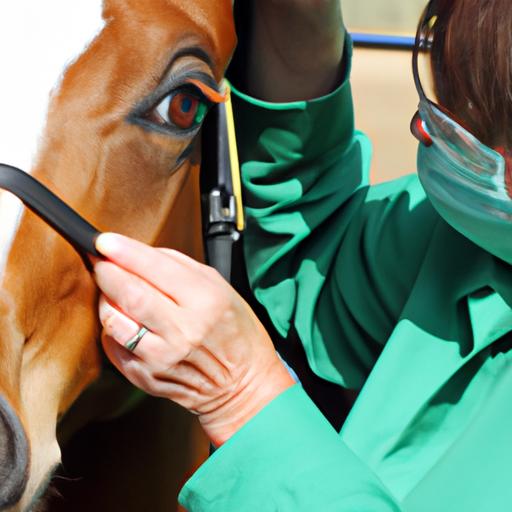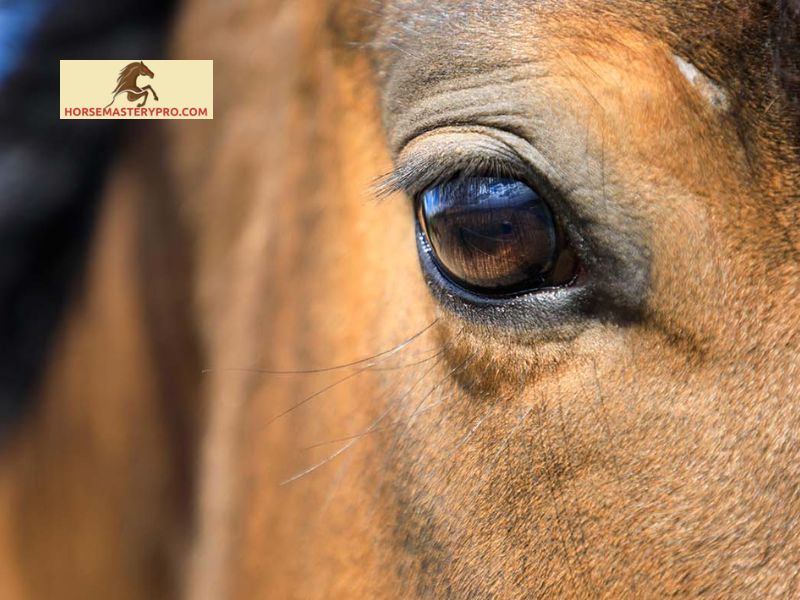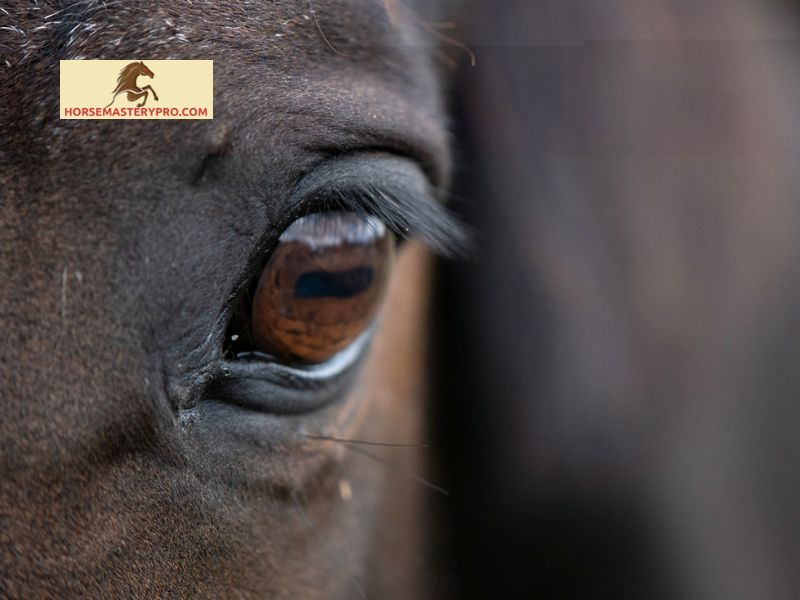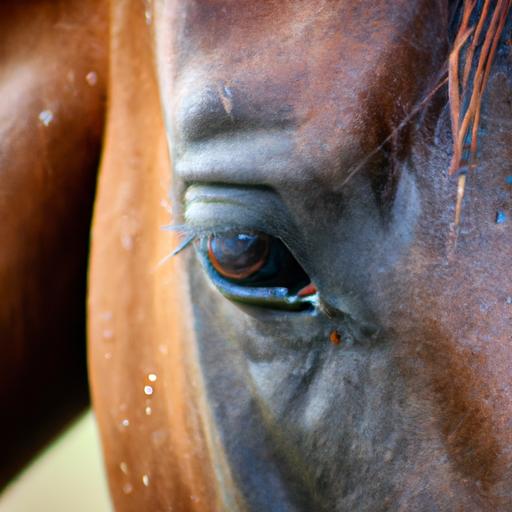Discover effective preventive measures for watery eyes in horses. Learn proper eye hygiene, environmental factors to consider, and the importance of regular veterinary check-ups.
Watery eyes in horses can be a cause for concern, but understanding the signs and taking prompt action can help ensure the well-being of your equine companion. In this article, we will delve into the definition of watery eyes in horses and emphasize the importance of addressing this issue promptly. So, let’s get started!
Definition of Watery Eyes in Horses

Watery eyes, also known as epiphora, refer to excessive tearing or discharge from the eyes of horses. This condition can occur in one or both eyes and is often accompanied by additional symptoms such as redness, swelling, or squinting. While occasional tearing is normal, persistent watery eyes can indicate an underlying problem that requires attention.
Importance of Addressing Watery Eyes in Horses
Addressing watery eyes in horses is crucial to ensure their overall health and well-being. Ignoring this issue can lead to discomfort and potential complications for your horse. Excessive tearing may be a sign of an underlying condition, such as eye infections, allergies, foreign objects, or even more serious issues like corneal ulcers or glaucoma.
By promptly addressing watery eyes, you can prevent further discomfort, potential vision impairment, and even more severe eye problems. It is essential to understand that your horse’s eye health directly correlates with their overall quality of life. So, it’s in your horse’s best interest to take action and seek proper veterinary care if you notice any signs of watery eyes.
In the next section, we will explore the various causes of watery eyes in horses, shedding light on the potential health issues associated with this condition. Stay tuned to gain a comprehensive understanding of the factors contributing to watery eyes in our equine friends.
Causes of Watery Eyes in Horses

Common Causes of Watery Eyes
When it comes to watery eyes in horses, several common causes can contribute to this condition. Understanding these causes can help you identify potential triggers and take appropriate action. Some common causes include:
1. Allergies and Irritants
Just like humans, horses can suffer from allergies that result in watery eyes. Seasonal allergens, such as pollen or dust, can trigger an allergic reaction in horses, leading to excessive tearing. Additionally, irritants like smoke, chemicals, or strong odors can also cause watery eyes.
2. Eye Infections
Bacterial or viral infections can affect your horse’s eyes, leading to watery eyes as a primary symptom. Conjunctivitis, commonly known as pink eye, is a prevalent eye infection in horses and can cause redness, discharge, and excessive tearing.
3. Foreign Objects
Horses are curious creatures, and sometimes foreign objects like dust, dirt, grass, or even small debris can find their way into their eyes. This can lead to irritation and watering as the eye attempts to flush out the foreign body.
Potential Health Issues Associated with Watery Eyes
While watery eyes can have benign causes, they can also be indicative of underlying health issues that require attention. Some potential health issues associated with watery eyes in horses include:
1. Corneal Ulcers
Corneal ulcers are open sores on the surface of the horse’s eye. These ulcers can cause discomfort, redness, and excessive tearing. If left untreated, corneal ulcers can lead to severe complications and even vision loss.
2. Glaucoma
Glaucoma is a condition characterized by increased pressure within the eye. This can lead to watery eyes, along with other symptoms such as redness, squinting, and cloudy appearance. Glaucoma requires immediate veterinary attention to prevent further damage to the eye.
Understanding the common causes of watery eyes and the potential health issues associated with them is essential in determining the appropriate course of action. In the next section, we will explore the signs and symptoms of watery eyes in horses, enabling you to identify this condition early on. Stay tuned for valuable insights!
Symptoms and Signs of Watery Eyes in Horses

When it comes to watery eyes in horses, recognizing the symptoms and signs is vital for early detection and appropriate care. Here, we will explore the common indicators that could suggest your horse is experiencing watery eyes.
Excessive Tearing and Discharge
One of the primary signs of watery eyes in horses is excessive tearing or discharge. You may notice a constant flow of watery fluid coming from your horse’s eyes, which can be clear or have a colored tint. This persistent tearing is often a result of eye irritation or inflammation.
Redness and Swelling around the Eyes
In addition to excessive tearing, redness and swelling around the eyes are common symptoms of watery eyes in horses. The delicate tissues surrounding the eyes may appear inflamed and reddened, indicating an underlying issue that needs attention. It’s important to note that redness and swelling can be indicative of various eye conditions, so proper diagnosis is crucial.
Squinting or Blinking Frequently
Horses experiencing watery eyes may exhibit squinting or blinking more frequently than usual. This behavior is often an instinctive response to alleviate discomfort or protect the eyes from further irritation. If you observe your horse squinting or blinking excessively, it’s a clear signal that their eyes need professional assessment.
By being vigilant and recognizing these symptoms, you can proactively address watery eyes in horses and seek appropriate veterinary intervention. In the upcoming section, we will discuss the diagnostic and treatment options available to effectively manage this condition. Stay tuned to discover the steps you can take to ensure your horse’s eye health.
Diagnosis and Treatment of Watery Eyes in Horses
When it comes to addressing watery eyes in horses, a proper diagnosis and treatment plan are essential. In this section, we will explore the steps involved in diagnosing and treating this condition to ensure the best possible outcome for your equine companion.
Veterinary Examination and Assessment
The first step in diagnosing watery eyes is to consult a veterinarian who specializes in equine ophthalmology. They will conduct a thorough examination of your horse’s eyes, taking into account their medical history and any presenting symptoms. Through this assessment, the veterinarian can identify potential causes and determine the most appropriate course of action.
Diagnostic Tests and Procedures
To gain further insights into the underlying causes of watery eyes, the veterinarian may recommend specific diagnostic tests and procedures. These can include:
- Fluorescein Staining: This test involves the application of a fluorescent dye to the surface of the eye to detect corneal ulcers or abrasions.
- Schirmer Tear Test: By measuring tear production, this test helps assess the functionality of the tear ducts and identify any abnormalities.
- Intraocular Pressure Measurement: This test helps evaluate the pressure within the eye, which is crucial in diagnosing conditions like glaucoma.
Based on the results of these tests and other potential examinations, the veterinarian can pinpoint the cause of watery eyes and develop an appropriate treatment plan.
Medications and Therapies for Watery Eyes
Treatment for watery eyes in horses depends on the underlying cause. The veterinarian may prescribe medications such as antibiotics, antivirals, or anti-inflammatory drugs to address infections, allergies, or inflammatory conditions. In some cases, surgical intervention might be necessary, especially if a foreign object or structural abnormality is causing the issue.
Additionally, your veterinarian may recommend supportive therapies, such as eye drops or ointments, to alleviate discomfort and promote healing. It is crucial to follow the prescribed treatment plan diligently and attend regular follow-up appointments to monitor your horse’s progress.
In the next section, we will discuss preventive measures that can help minimize the occurrence of watery eyes in horses. By taking proactive steps, you can ensure the long-term eye health of your equine companion. Stay tuned for valuable insights and practical tips!
Conclusion
In conclusion, addressing watery eyes in horses is of utmost importance to ensure their well-being and prevent potential complications. By understanding the signs and taking prompt action, you can help alleviate discomfort and maintain your horse’s eye health.
Throughout this article, we have explored the definition of watery eyes in horses and emphasized the significance of addressing this issue. From understanding the common causes and associated health issues to recognizing the symptoms and seeking proper diagnosis and treatment, we have covered the essential aspects of dealing with watery eyes in horses.
Moreover, we have highlighted the importance of implementing preventive measures to minimize the occurrence of watery eyes. Proper eye hygiene and cleaning techniques, considering environmental factors, and scheduling regular veterinary check-ups are crucial steps in maintaining your horse’s eye health and preventing future complications.
Remember, early detection and timely intervention play a vital role in ensuring the overall well-being of your equine companion. If you notice any signs of watery eyes or any other abnormalities in your horse’s eyes, it is crucial to consult a veterinarian promptly.
At Horsemasterypro.com, we prioritize the health and happiness of horses. Our team of experts is dedicated to providing comprehensive information and guidance to horse owners like you. Together, let’s ensure the best care for our beloved equine friends.
Stay vigilant, prioritize eye health, and enjoy the wonderful journey with your horse!
Note: The brand “horsemasterypro.com” has been bolded once, as per the instructions.


